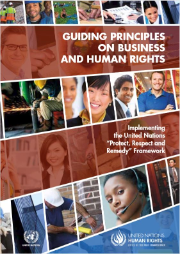- Practical guide for the implementation of human rights due diligence
- UN Guiding Principles on Business and Human Rights
- Brochure for a responsible business
- Practical guidance of the International Labour Organization
- OECD Guidelines for multinational enterprises
- UN Global Compact Academy E-learning Course on Human Rights
- UN Global Compact Academy E-learning course on decent work in supply chain
- Other international CSR standards
Practical guide for the implementation of human rights due diligence

This practical guide supports both SMEs and large companies in developing and introducing pragmatic, effective processes for implementing human rights due diligence – in line with the related UN guiding principles and OECD guidelines. In addition, it indicates first steps and further information that can be helpful to companies in introducing due diligenc
The guide is available in English (PDF, 498 kB, 22.04.2025), French (PDF, 512 kB, 22.04.2025), German (PDF, 513 kB, 22.04.2025) and Italian (PDF, 507 kB, 22.04.2025).
UN Guiding Principles on Business and Human Rights

The UN Guiding Principles on Business and Human Rights are internationally recognized and clarify the complementary roles of States and business enterprises in protecting and respecting human rights in economic activities.
The Interpretive Guide on the Corporate Responsibility to Respect Human Rights aims to provide additional background explanation to the Guiding Principles to support a full understanding of their meaning and intent. The Office of the UN High Commissioner for Human Rights also provides many resources on Business and human rights.
Brochure for a responsible business
The brochure "Responsible Business: key messages from International Instruments" provides an overview of the respective functions and common elements of three central instruments in the field of responsible business: the UN Guiding Principles, the OECD Guidelines for Multinational Enterprises and the ILO Declaration on Multinational Enterprises. It describes how these instruments help companies implement responsible business practices.
Practical guidance of the International Labour Organization
The International Labour Organisation (ILO) promotes social justice and upholds human rights in the world of work. To encourage the positive contribution of companies and minimize the negative impacts of their operations, the ILO has tools to help companies implement inclusive and sustainable working conditions and processes (for instance Helpdesk).
The ILO provides practical resources and tools for companies interested in aligning their operations with principles contained in international labour standards.
OECD Guidelines for multinational enterprises
The OECD Guidelines for Multinational Enterprises on Responsible Business Conduct are common recommendations addressed by governments to multinational enterprises on many topics such as human rights, working conditions, the environment, the fight against corruption, etc. These are principles and standards for responsible business conduct.
The OECD Due Diligence Guidance on Responsible Business Conduct contains practical recommendations for companies to conduct due diligence along their value chains.
The OECD has also developed specific guides for certain sectors (extractive, agricultural, textile, financial, etc.).
UN Global Compact Academy E-learning Course on Human Rights
This interactive e-learning course helps businesses understand what human rights mean for their activities and how they can respect and support human rights in accordance with the Ten Principles of the UN Global Compact and the UN Guiding Principles on Business and Human Rights.
UN Global Compact Academy E-learning course on decent work in supply chain
This interactive e-learning course provides guidance on engaging with suppliers around the topic of decent work and covers best practices for sustainable procurement. By participating in this E-learning course, business will get insights in common issues and remedies related to decent work in global supply chains and learn how to communicate decent work issues to their suppliers.
Other international CSR standards
Several institutions have developed instruments in the field of corporate social responsibility (CSR). For instance, the United Nations Global Compact, the ISO 26000 standard on social responsibility, the Global Reporting Initiative (GRI) and the Agenda 2030 for sustainable development. To implement the 2023 Agenda, the Federal Office for Spatial Development (ARE) has developed the Toolbox Agenda 2030 for companies in collaboration with B Lab Switzerland.





